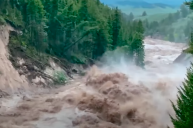A federal judge this week sentenced the Michigan man who illegally diverted a river to Lake Michigan for boat access in Sleeping Bear Dunes by banning him from all national park properties. According to Wednesday's announcement, 63-year-old Andrew Howard will also serve five years of probation and must pay more than $26,000 for his August 2022 crime.
Mark Totten, the U.S. attorney who prosecuted the case, described Howard's behavior as an unreasonable reaction to a dispute over park policy about dredging the Platte River. "While Mr. Howard had the right to disagree and advocate for his position, he did not have the right to take the law into his own hands and force his favored result," Totten said. He added that Congress gave the National Park Service the power to make such decisions.
Diverting the Platte River
In February, a federal court convicted Howard of two misdemeanors for tampering and vandalism at the Sleeping Bear Dunes National Lakeshore. At trial, prosecutors argued that Howard used a shovel to dig sediment and rocks from the river basin on Aug. 15, 2022. Then, he stacked large rocks on a dam to divert the river's natural flow toward a newly created channel out to the lake.
Prosecutors say before the incident, the Park Service and the Coast Guard used significant resources to study the national lakeshore. They looked at the wildlife and adjoining habitats, including the Platte River, which flows on land and along the shore. As a result, they opted to protect the area as it is home to several endangered animals and threatened plant species.
Days after Howard diverted the water, the channel expanded to about 200 feet in width. Prosecutors say it created opportunities for large boats to gain "unauthorized access" to Platte Bay.
Prosecutors say the diversion resulted in water levels decreasing significantly and causing wetland vegetation to dry and ultimately die. They added that due to the fragility of the ecosystem, the Park Service's option is to monitor and assess the damage.




